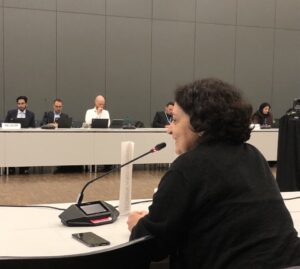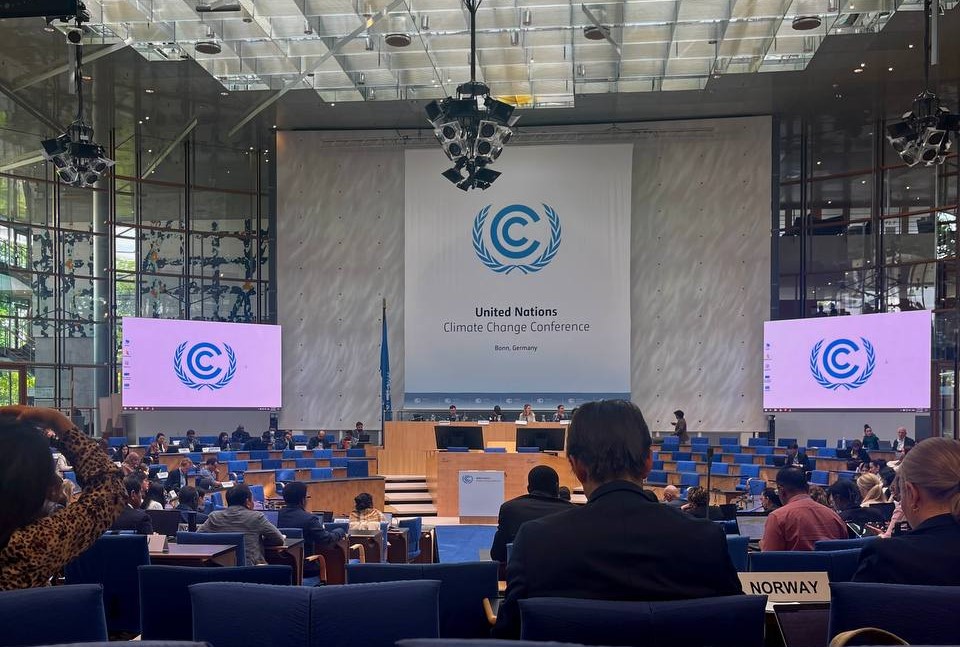In the last month of June, cambiaMO attended The 60th Sessions of the UNFCCC Subsidiary Bodies (SB60) in Bonn, Germany which outcomes will help shape the agenda for the upcoming COP29 UN Climate Change Conference in Baku, Azerbaijan, in November 2024.
These weeks are crucial to fostering consensus and cooperation among parties, providing a space to address key issues obstructing progress on climate action, seeking common solutions, and creating a solid basis for the COP29 negotiations. cambiaMO followed various negotiations, dialogues, and workgroup sessions, focusing on the Just Transition, Climate Action Empowerment (ACE), the Global Stocktake (GST), and Climate Finance.

On the first day of the conference, Floridea Di Ciommo, director of cambiaMO, gave a speech on behalf of the Women and Gender Constituency on the Talking Points for Unpacking the Positive and Negative Impacts of Low and Zero Emission Transport Technologies of the Just Transition program. She highlighted how, as we look to redesign and recreate our transport systems, the WGC strongly advocates for systems that respond and are designed to meet the needs of the people by promoting public forms of transport accessible to all. The individual car dependency does not address the shift from one extractive system based on fossil fuels to be replaced with one based on critical minerals. Particularly, countries from the global North need to consider efforts to reduce material and energy use. We need safe public transport, that is disability accessible, that is affordable. Future transport systems must therefore be designed to meet the use and accessibility needs of people of all genders, ages, and abilities.
Inclusive participation is one of the key aspects to reaching a Just Transition, for which it is crucial to highlight its intersection with the Action for Climate Empowerment (ACE) elements. We ask for finding a way to operationalize Action for Climate Empowerment elements, with a strong gender-transformative approach, as well as its key human rights of access to public information and participation. We also wish to emphasize the importance of gathering inputs from specific entities and experts on inclusion, participatory and gender transformative approaches, and related topics. As well as recognizing the importance of the ACE Gallery posters. The posters showcased the opportunities for tested public participatory tools, where cambiaMO, together with the ACE observatory, has transferred the lessons learned from the CLIMAS project. Advocating for a Global People Assembly to ensure that marginalized communities, grassroots representatives, and all people in vulnerable situations, including women and girls in all their diversity, Indigenous peoples, and youth inform climate policy.
This operationalization of the ACE elements passes through the identification of means of implementation, including financial engagement and political willingness of countries’ governments. Parties need to raise awareness and allocate resources, for properly and more ambitiously adjusting the Global Stocktake (GST). Strong progressive language is needed for the GST discussion, and while some of the suggestions were accepted, we believe that further commitment is needed
Reflecting on the outcomes of the SB60 conference, it is clear the transversal impact of Climate Finance and how it intersects with every aspect of the different negotiations. During these weeks, countries struggled to reach any form of compromise regarding the New Collective Quantified Goal (NCQG). Therefore, we highlight the critical need for a renewed commitment to ambitious financial targets, to ensure the necessary funding resources. Only with adequate financial engagement and political will can we properly operationalize the elements of Action for Climate Empowerment (ACE) and adjust the Global Stocktake (GST) more ambitiously. This commitment is crucial for fostering inclusive, participatory, and gender-transformative approaches to climate policy, ensuring that the voices of marginalized communities and vulnerable populations are heard and valued. As we look ahead to COP29, we must pursue strong cooperation and unwavering commitment to impactful climate action







